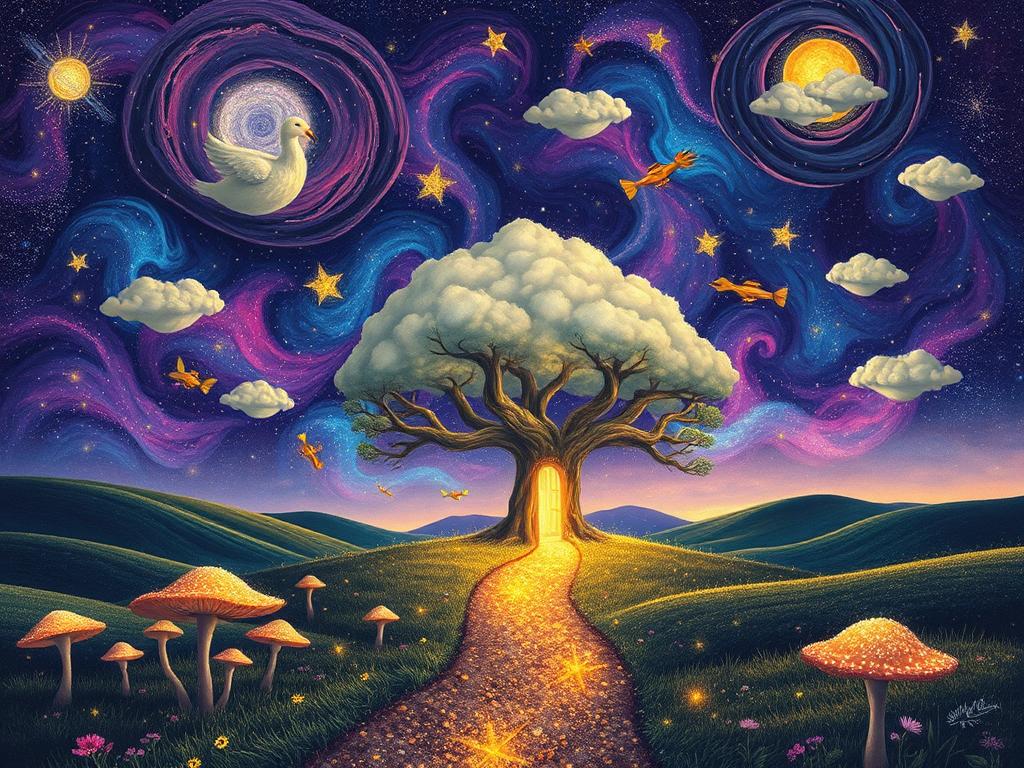
The Intriguing World of Dreams: Exploring Their Meaning and Interpretation
The Intriguing World of Dreams: Exploring Their Meaning and Interpretation
Unlocking the Secrets of Dream Interpretation: A Comprehensive Guide
Dreams are a fascinating phenomenon that intrigues and perplexes humans across cultures and generations.
From ancient civilizations interpreting dreams as prophecies to modern psychologists exploring their meaning as reflections of our subconscious, dreams hold a significant place in both personal introspection and cultural narratives.
This article will delve into the intricate realm of dream interpretation, providing you with insights, techniques, and a comprehensive understanding of how to decipher your dreams effectively.
Whether you are a casual dreamer or someone who experiences vivid and compelling dreams, this exploration will enhance your awareness of your subconscious, facilitate emotional healing, and inspire personal growth.
Understanding Dreams: A Deeper Look

To unlock the secrets of dream interpretation, one must first understand what dreams truly are.
Dreams occur during the REM (Rapid Eye Movement) phase of sleep and can encompass a wide array of visual, auditory, and emotional experiences.
According to Sigmund Freud, dreams serve as a window into our subconscious desires, fears, and emotions.
He posited that dreams are “the royal road to the unconscious,” where repressed thoughts and feelings surface.
On the other hand, Carl Jung expanded this view, suggesting that dreams are not merely reflections of the unconscious but also symbols that connect us to our collective human experience.
The Different Types of Dreams
Dreams vary widely in type and purpose.
Here are some common categories of dreams:
- Lucid Dreams: In lucid dreams, the dreamer is aware they are dreaming and may have some control over the dream’s narrative.
- Nightmares: Nightmares are distressing dreams that cause anxiety or fear, often reflecting unresolved stressors or traumas.
- Recurring Dreams: These dreams repeat over time and can indicate unresolved issues or emotions that need addressing.
- Daydreams: Unlike nighttime dreams, daydreams occur when we are awake. They are often significant for manifesting our desires and aspirations.
- Prophetic Dreams: Sometimes dreams are believed to foretell future events, predicated on cultural beliefs and personal experiences.
The Science Behind Dreaming
The scientific study of dreams, known as oneirology, has come a long way in understanding how dreams function biologically and psychologically.
During sleep, our brains engage in various processes that consolidate memories and process emotions.
Research has shown that dreaming plays a vital role in psychological health, facilitating problem-solving and creativity.
According to a study published in the journal Nature, dreaming enhances our ability to navigate complex social situations and emotional challenges.
Common Themes in Dreams
Many dreams contain common themes and symbols, which can vary across cultures but often share universal meanings.
For instance, flying can symbolize freedom and ambition, while falling may reflect feelings of insecurity or loss of control.
Other common dream themes include:
- Being chased: Often indicates feelings of anxiety or avoidance about a certain issue.
- A journey: Represents growth and self-discovery.
- Water: Symbolizes emotions; calm water may suggest peace, while turbulent water can reflect stress.
- Death: Typically signifies transformation or change rather than literal death.
Dream Journals: A Tool for Analysis
One effective way to enhance your understanding of your dreams is by keeping a dream journal.
Writing down your dreams upon waking helps to capture the details, themes, and emotions associated with them.
Consider including:
- Brief descriptions of the dream
- Emotions felt during the dream
- Key symbols and images
- Personal circumstances that may relate to the dream
- Your interpretations or reflections upon waking
Over time, patterns and insights may emerge, providing valuable information about your internal landscape.
Interpreting Your Dreams: Techniques and Tips
Interpreting dreams is both an art and a science.
Here are some strategies to help you analyze your dreams effectively:
- Pay Attention to Details: Note every aspect of your dream, including colors, feelings, and actions.
- Identify Key Symbols: Look for recurring symbols in your dreams and research their meanings.
- Reflect on Emotions: Consider how you felt during and after the dream; emotions are often revealing.
- Connect with Your Reality: Relate your dreams to recent events or stressors in your waking life.
- Seek External Resources: Use dream dictionaries or consult with a therapist for deeper insights.
Case Studies: Famous Dream Interpretations
“The interpretation of dreams is the royal road to a knowledge of the unconscious activities of the mind,” Freud once famously said.
Throughout history, several notable figures have used dream interpretation to unlock personal insights and creative ideas.
For example, Paul McCartney famously dreamed the melody for “Yesterday,” providing an artistic breakthrough in his career.
Another case is that of Mary Shelley, who drew inspiration from her dreams when writing the novel “Frankenstein.”
Contemporary artists and creatives often look to their dreams for inspiration, further affirming that our subconscious holds a wealth of untapped resources.
The Connection Between Dreams and Reality
Understanding dreams can also impact our daily lives.
As we decode our dreams, we gain insights that can inform our relationships, self-awareness, and decision-making.
Moreover, dreams can serve as a form of self-therapy, allowing us to confront fears or unresolved conflicts in a safe space.
By analyzing dreams, we can uncover patterns that may hinder personal growth or happiness and cultivate positive change.
Conclusion: The Power of Dreams
In conclusion, dreams are powerful vessels of insight and understanding.
By approaching dream interpretation with curiosity and openness, we can unlock meanings and messages that serve our personal development.
Whether you use dreams for creative inspiration, emotional healing, or self-discovery, they hold significant value in our lives.
Begin your journey into dream analysis by keeping a dream journal, reflecting on recurring themes, and seeking deeper understanding.
Your dreams are waiting to be discovered. Embrace them, and allow them to guide you on your path to self-awareness.
FAQs
What is the significance of dreaming?
Dreaming plays a vital role in memory consolidation and emotional processing.
It serves as an avenue for exploring our subconscious thoughts and feelings while promoting creativity and problem-solving.
Can I control my dreams?
Yes, through a practice called lucid dreaming, you can learn to recognize that you are dreaming and potentially steer the direction of your dreams.
Techniques such as reality checks and keeping a dream journal can aid in achieving this state.
What if I have recurring nightmares?
Recurring nightmares may indicate unresolved stress or anxiety in your waking life.
Consider keeping a dream journal and consult with a mental health professional for support and coping strategies.
How can I enhance my dream recall?
Improving dream recall often involves establishing a routine for waking up.
Upon awakening, remain still and deliberately recall your dreams, then write them down immediately.
Are there cultural differences in dream interpretation?
Yes, different cultures possess unique perspectives and interpretations of dreams.
For instance, indigenous cultures may see dreams as a means of communication from ancestors, while Western psychology leans towards personal reflection.
If you’re interested in engaging further with the topic of dreams and testing your knowledge, check out the fascinating list of 100 very hard quiz questions provided.
With a vast array of categories that challenge even the keenest minds, these questions prompt both introspection and exploration.
Challenge your friends with these questions and see who can get the highest score with the following quiz:
- What is the only planet in our solar system that rotates clockwise?
- Who composed the music for the ballet “The Firebird”?
- What is the longest river in the world?
- In which year did the Berlin Wall fall?
- Which element has the highest melting point?
- Who was the first woman to fly solo across the Atlantic Ocean?
- What is the capital city of Bhutan?
- Which organ in the human body has the ability to regenerate?
- What is the smallest prime number?
- In what year did the Titanic sink?
- Who is credited with formulating the laws of motion and universal gravitation?
- Which Shakespeare play features the characters Rosencrantz and Guildenstern?
- What is the rarest blood type in the world?
- Who discovered penicillin?
- What geometric shape is generally used to represent the planet Earth?
- Who painted the “Mona Lisa”?
- How many bones are there in the adult human body?
- What ancient civilization built the Machu Picchu complex in Peru?
- Which artist is known for the creation of the “Scream”?
- What is the chemical symbol for the element gold?
- Who was the longest-serving British Prime Minister?
- What language has the most words?
- Which gas makes up about 78% of Earth’s atmosphere?
- Which planet has the most extensive ring system?
- Who was the first person to reach the South Pole?
- In what year was the first email sent?
- Which scientist developed the uncertainty principle?
- Who wrote the novel “1984”?
- What is the capital of Mongolia?
- Which animal is known to have the longest lifespan?
- Who is the author of “Pride and Prejudice”?
- What is the rarest naturally occurring element on Earth?
- In which country would you find the ancient city of Petra?
- What is the hardest natural substance on Earth?
- Who was the first African American to receive a Nobel Prize?
- In Greek mythology, who is the god of the sea?
- What is the most spoken language in the world?
- Which planet is known for its Great Red Spot?
- Who wrote the famous poem “The Road Not Taken”?
- What is the main ingredient in traditional Japanese miso soup?
- What was the first animated feature film to be nominated for Best Picture?
- In what year did World War I begin?
- Who painted the ceiling of the Sistine Chapel?
- What is the capital of Cyprus?
- Which vitamin is primarily produced when the skin is exposed to sunlight?
- Who developed the theory of relativity?
- What is the largest desert in the world?
- What is the only mammal capable of true flight?
- Who is known as the “Father of Geometry”?
- In which country would you find the Eiffel Tower?
- What does DNA stand for?
- Which famous battle took place in 1815?
- Who wrote “The Great Gatsby”?
- What is the hardest known mineral?
- In what year did the first manned moon landing occur?
- Who formulated the periodic law?
- Which is the largest planet in our solar system?
- What is the capital of Iceland?
- Who is the author of the “Harry Potter” series?
- What is the rarest gem in the world?
- Which organ is responsible for pumping blood throughout the body?
- Who invented the telephone?
- What is the known age of the Earth in billions of years?
- Who was known as the “Iron Lady”?
- Which country has the most UNESCO World Heritage Sites?
- What is the capital city of Canada?
- What is the smallest country in the world by land area?
- Which ancient civilization is known for its pyramids?
- Who is the Greek goddess of wisdom?
- What is the main language spoken in Brazil?
- Which planet is known as the Earth’s twin?
- Who was the first female Prime Minister of India?
- What is the chemical symbol for sodium?
- Which instrument is known as the king of instruments?
- Who was the first man to walk on the moon?
- What is the tallest mountain in Europe?
- What is the currency of Japan?
- Which Shakespeare play features the character of Lady Macbeth?
- How many continents are there on Earth?
- Who was the famous civil rights leader that delivered the “I Have a Dream” speech?
- What is the main ingredient of tofu?
- In which country would you find the Colosseum?
- What is the name of the longest river in the United States?
- Who painted “The Starry Night”?
- What is the median age of the global population as of 2023?
- In which decade did the first human heart transplant occur?
- Which African country was formerly known as Abyssinia?
- What is the chemical formula for table salt?
- Who is considered the founder of psychoanalysis?
- In what year did the Chernobyl disaster occur?
- What is the capital city of Australia?
- Who invented the lightbulb?
- Which famous physicist developed the theory of electromagnetism?
- In what year did the internet become widely accessible to the public?
- Who narrated the television series “Cosmos: A Spacetime Odyssey”?
- What is the primary ingredient in hummus?
- Who wrote the “Iliad” and the “Odyssey”?
- What type of animal is the giant panda?
- Which planet is known for its unique tilt and extreme seasons?
- What is the name of the largest ocean on Earth?
Now that you’ve challenged yourself with these intriguing questions, consider sharing your thoughts, experiences, or questions about dreams in the comments section below.
Dream analysis is a lifelong journey, and every insight can transform how you perceive your dreams and your waking life. Why do dreams happen?





